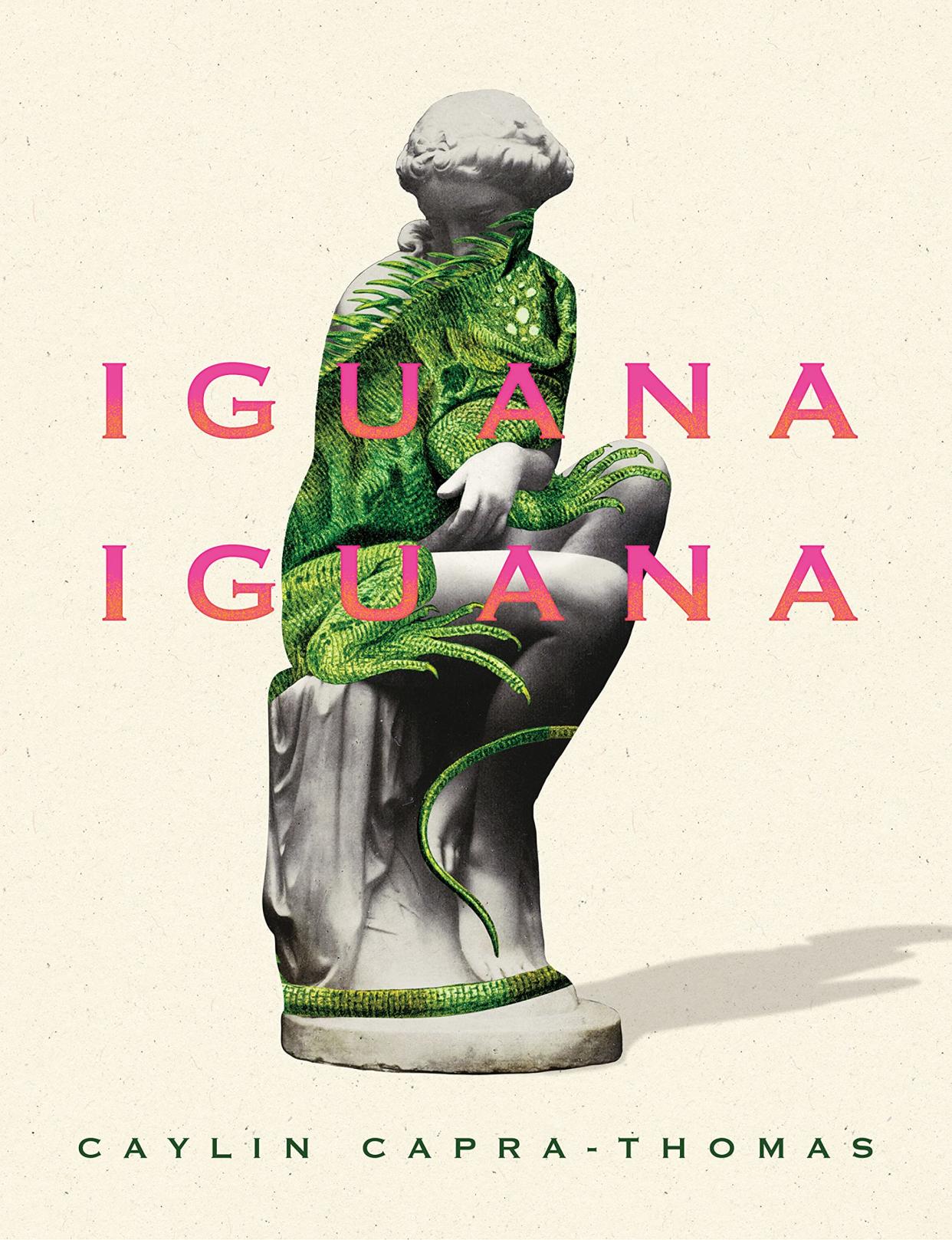With 'Iguana Iguana,' Columbia poet Caylin Capra-Thomas offers one of 2022's best collections

Caylin Capra-Thomas knows how to make an entrance.
By turns, the Columbia-based poet's opening lines stagger, expose, beguile; they put readers on notice, complicate narratives we too easily swallow, heighten the senses and offer end-around encouragement.
Lesser artists might cross this initial threshold, then stumble. Certainly, filmmakers crumble beneath expectations set in an epic opening sequence; writers of every genre fail to keep the promises made by early sentences. Not Capra-Thomas.
"It's hard to tell what will be important," she writes in the very first line of her new collection, "Iguana Iguana," forthcoming this summer from Texas-based publisher Deep Vellum.
To sit with the book is to know it's all important — Capra-Thomas never wastes a word or loses her voice. Her seamless lyricism and particular perspective ring true, making "Iguana Iguana" one of the best poetry collections of 2022.
More: Roots N Blues fest to induct Jeff Tweedy into its Missouri Roots Songbook
Rites of 'Passage'
Capra-Thomas chases her very first opening line, which leads the poem "Passage," into gorgeous melancholy, a coming-of-age ballad that is neither nostalgic or callous. Spying a gathering of teenagers beside a river, her speaker observes them "sideways / glancing, suspicious as crows. / Each in the cluster a dead version of yourself."
Witnessing youth from just inside whatever station succeeds it, the speaker meditates on ways language both fulfills and fails to capture time's passage. "The obscure chorus of your own life / keeps cawing into the diamond dark, under the roaring / of each body you inhabit," Capra-Thomas writes.

Much of "Iguana Iguana" revolves around the specific wisdom we pass to those at our heels. This inheritance is most evident in "For My Twenty-Year-Old Sister On My Thirtieth Birthday," which opens with a necessary declaration: "Nobody knows what they're doing, Maddie."
From a plot of land just beautiful and strange enough to disorient, the speaker describes her own twenties with clarity and resignation; some mysteries defy description and must be lived to be absorbed at the level of soul and skin.
"Know me, sister. / I bequeath you the decade between us," Capra-Thomas writes.
This vision of changing by degrees, in which maturity both hums in the chest and arrives like an out-of-body experience, expresses itself in the opening line of "Supermassive" — "I stood at the sink and became a few minutes older"; it shifts shape, bending into unsettling wisdom in a passage from "Callahan and Sumner":
"And it's wild how we hold / so many miles inside us, but some people die / in the same town where they were born."
More: Jason Kander reveals a fuller picture of life with PTSD in bestselling new book
This sort of inside-out revelation, from sad-eyed observation to something like acceptance, colors "Patron Saints," in which the speaker brokers a quiet, sobering accord between faith and reality:
"And when I saw nothing / but late winter's gold lick the forsaken trees / and some schoolmates tool by in an old Saturn / ringed around the rims with snow, I knew / I'd been abandoned by something, that Saint / So-and-So was sleeping, forever sleeping—leave / her be—and whatever I was waiting for lived / somewhere else and I was never coming back."
A place of our own
Whether through physical detail or spiritual awareness, Capra-Thomas transmits a felt sense of place throughout "Iguana Iguana."
Several poems sweat their way through the enveloping humidity, and around the slippery characters, of Florida. Another, "Chambers," examines the stakes on either side of the Arizona-New Mexico line.
More often, Capra-Thomas creates lived-in sensations — of places without names, moments as sealed memories.
The speaker in "Stranger Danger" looks back on a childhood in which her fearful mother "had me / recite our address and spell my last name / until my lids" while her older brother roamed free like an adolescent coyote.
Poems like "Twister" travel the contours of a "lunatic river" while "Not the Fly But the Amber" offers the image of "Twin / sunflowers in an empty bourbon bottle." Unfamiliar, perhaps, yet immediately recognized and instinctively known.
Paying attention
"How are any of us to bear what we create?" Capra-Thomas writes from within "The Funny Part," a poem which begins with talk of tomato plants and an anxious gardener who crushes "cigarettes into dead leaves" and plants "the filters with shaking hands."
"The Funny Part" cuts to the heart of the collection, as Capra-Thomas faithfully turns over words like tend, attend and attention, longing to know everything that makes them so similar and all that separates them.
To create anything and not lose yourself, to tend and be tended to, requires rare degrees of awareness. As Capra-Thomas' poems demonstrate, you must hold forces in tension: vulnerability and fragility in one hand, resilience and self-forgiveness in the other.
As even the most pitiful gardener knows, a plant grows more tender the farther you travel from roots to stem to flower. So handle with care.
The poet's speakers envision caring for themselves in both promising and doubtful ways. The voice sounding through "Window" follows another killer opener — "So many friends I've caught beautiful, not knowing it" — toward shivers of danger and flickers of fire as assurances of beauty.
They want to be caught: cooking "near-naked by the kitchen window," leaving the TV turned up or the stove turned on; anything to be fanned into flame.
The speaker of "Spring-Loaded" leans into a daydream, in which being cared for involves "a specific man" touching them from behind, perching atop their bed "on a Thursday afternoon" to "tip scotch / between my lips while the refrigerator repairman grunts / on his haunches in the next room."
Sharp humor becomes a means to care — or least protect oneself long enough to sift the past for insight. "He drank my whiskey / hot. He left me feeling cold" (from "A Pilgrim is a Foreigner") is a line worthy of Bob Dylan or Joni Mitchell. Poignant and amusing, "All My Exes Live in this Poem" is perhaps our age's great unwritten country song.
More: 6 things to know before the 2022 Mizzou International Composers Festival
More viable and fulfilling, these poems suggest, is the eyes-wide-open approach Capra-Thomas experiences and encourages. Tending one's own attention means seeing the world not as solely beautiful or brittle but a tangle of the two.
In this, we are likely to find something worth saying and savoring beneath an electric storm ("Lightning Suspected in Deaths of Horses"), when enveloped by winter ("Whiteout") or in the slightest degree of connection and hope ("Present Conditional"). There, Capra-Thomas writes:
"If something is broken / within me, it is not / the most vital part. / There are keys in my pocket. / Somewhere else, / an opening."
Locals can experience more from "Iguana Iguana" Sept. 1 when Capra-Thomas reads alongside poet S. Yarberry at Skylark Bookshop. To learn more about the poet and her work, visit https://caylincaprathomas.com/
Aarik Danielsen is the features and culture editor for the Tribune. Contact him at adanielsen@columbiatribune.com or by calling 573-815-1731. Find him on Twitter @aarikdanielsen.
This article originally appeared on Columbia Daily Tribune: Columbia poet Caylin Capra-Thomas delivers one of 2022's best books

